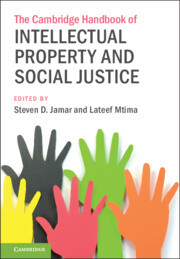Description
The Cambridge Handbook of Intellectual Property and Social Justice
Cambridge Law Handbooks Series
Coordinators: Jamar Steven D., Mtima Lateef
Language: English
Subject for The Cambridge Handbook of Intellectual Property and...:
Publication date: 01-2024
600 p. · Hardback
600 p. · Hardback
Description
/li>Contents
/li>Biography
/li>
Protection for intellectual property has never been absolute; it has always been limited in the public interest. The benefits of intellectual property protection are meant to flow to everyone, not just a limited population of creators and the corporations that represent them. Given this social-utility function, intellectual property regimes must address issues of access, inclusion, and empowerment for marginalized and excluded groups. This handbook defines an approach to considering social justice in intellectual property law and regulation. Top scholars in the field offer surveys of social justice implementation in patents, copyright, trademarks, trade secrets, rights of publicity, and other major IP areas. Chapters define Intellectual Property Social Justice theory and include recommendations for reforming aspects of IP law and administration to further social justice by providing better access, more inclusion, and greater empowerment to marginalized groups.
Prolusion: what is intellectual property (And why should you care about it anyway?) – A layperson's guide to intellectual property law Lateef Mtima; Introduction: intellectual property social justice theory: history, development, and description Lateef Mtima and Steven Jamar; Part I. IP Social Justice Foundations: 1. Mapping the IP social justice frontier Peter Menell; 2. The Indians who were not heard and the band that must not be named: racial formation and social justice in intellectual property law Margaret Chon and Robert Chang; 3. Intellectual property social justice: a theoretical rationale Lateef Mtima; Part II. IP Social Justice in Major Intellectual Property Domains: 4. People are the lifeblood of innovation: IP-SJ and patents Mason Marks; 5. Copyright and the interdependent relationship between social utility and social justice Lateef Mtima; 6. Trademarks, legal remedies, and social injustices Hannibal Travis; 7. Trade secrets from an IP social justice perspective Steven Jamar; 8. Tattoo use: what does the right of publicity have to do with it? Yolanda King and Lateef Mtima; Part III. IP Social Justice: Historical Perspectives: 9. Copyright, music, and race: the case of mirror cover recordings Robert Brauneis; 10. They knew it all along: patents, social justice, and fights for civil rights Kara Swanson; 11. Unequal copyright in the 19th century Zvi Rosen; Part IV. IP Social Justice in the Political Economy: Engaging Activism; Achieving Change: 12. Applying social justice principles in the practice of IP Law Krista Cox; 13. The lead sheet problem in music copyright: Williams and Skidmore revealed the systematic diminution of pop music's aural composers Sean O'Connor; 14. Works of 'Recognized Stature' under VARA: Recognized by whom? Sue Liemer; 15. Intellectual property empowerment and protection for prisoners John Whitman; 16. User-generated transformation: IP, social justice, and fanworks Elizabeth Rosenblatt; 17. Libraries, copyright exceptions, and social justice Jonathan Band and Brandon Butler; 18. A social justice perspective on IP protection for artificial intelligence programs Steven Jamar; Part VI. IP Social Justice in Global Perspective: 19. Intellectual property social justice on the international plane Zehra Betül Ayranci; 20. IP, social justice & human development: empowering female entrepreneurs through trademark law J. Janewa Osei Tutu; 21. Controversial trademarks: a comparative analysis Mairana Bernal Fandiño; 22. Exposing gender bias in intellectual property law: the UK music industries Mteka Potocnik; 23. The role of non-rightsholders advocates and academics in achieving social justice balance in copyright: The case of Colombia Marcela Palacio Puerta; Part VII. IP Social Justice: The Future of the Global IP Ecosystem: 24. IP and social justice futures Debora Halbert and Billy Meinke; 25. Patenting custom fit, aspiring for social justice Shubha Ghosh; 26. A primer on critical race IP Deidre Keller and Anjali Vats; 27. Intellectual property after George Floyd Madhavi Sundar.
Steven D. Jamar is a Professor Emeritus at Howard University School of Law and the Associate Director of the Institute for Intellectual Property and Social Justice, (IIPSJ), an NGO dedicated to advancing equitable access, inclusion, and empowerment in IP-related matters for traditionally marginalized and excluded people.
Lateef Mtima is a Professor of Law at the Howard University School of Law and the Founder and Director of the Institute for Intellectual Property and Social Justice. He has testified before Congress in support of IIPSJ's advocacy for socially just access, inclusion, and empowerment throughout the IP ecosystem.
Lateef Mtima is a Professor of Law at the Howard University School of Law and the Founder and Director of the Institute for Intellectual Property and Social Justice. He has testified before Congress in support of IIPSJ's advocacy for socially just access, inclusion, and empowerment throughout the IP ecosystem.
© 2024 LAVOISIER S.A.S.
These books may interest you

Australian Intellectual Property Law 145.67 €



